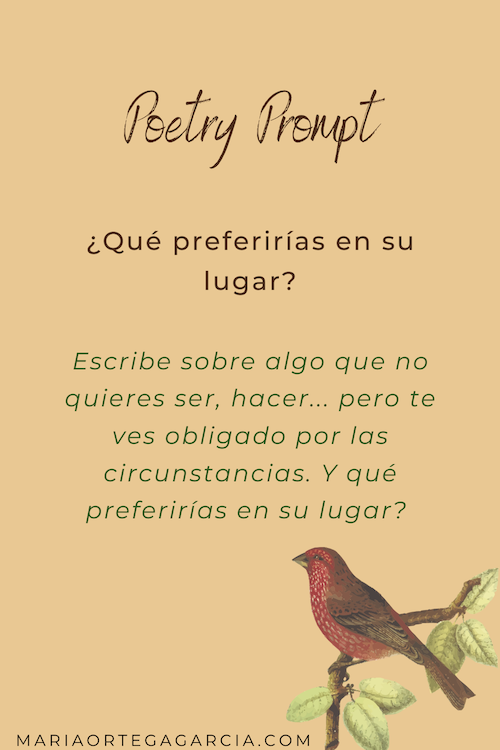Writing poetry in your target language is – can be–, a way to more than increasing vocabulary and reaching accuracy. Although these reasons are already good in themselves.
Writing poetry through guided prompts can help you nail down grammar structures in manner that involves your emotions and your experiences.
There can be no knowledge without emotion. We may be aware of a truth, yet until we have felt its force, it is not ours. To the cognition of the brain must be added the experience of the soul.
– Arnold Bennett
Poetry Prompt to Practise Hypothesis (imperfecto subjuntivo + condicional)
In this post we will work with a poetry prompt to practise the imperfecto de subjuntivo, and condicional through a question:
¿Qué preferirías en su lugar?
Escribe sobre algo que no quieres ser, hacer… pero te ves obligado por las circunstancias. Y qué preferirías en su lugar.
You can start with:
Si no tuviera que… (If I didn’t have to)
And then continue with the condicional
Si no tuviera que vivir en la ciudad
Viviría en el el campo.
Pero el trabajo me ata a las calles pavimentadas
Y los autobuses regulares que me llevan de casa a la oficina
De la oficina a casa
Si no trabajara en la ciudad
Viviría en el campo.
Trabajaría desde casa
Y no andaría estresado.
Here we want to practise the unlikely hypothesis, that is, the hypothesis that are not impossible to achieve but they are not likely to happen because they happen in the real time, and the real time carries a momentum.
Let’s explore this structure
Si + imperfecto subjuntivo // condicional
Through the poem I just wrote as example
Si no tuviera que vivir en la ciudad (If I didn’t have to live in the city)
Viviría en el campo (I’d live in the countryside)
The reality is that, right now, I have to live in the city and that’s not likely to change right this moment, which makes me living in the countryside unlikely.
Another prompt that will elicit the use of the imperfecto de subjuntivo and / or condicional is the following:
¿Qué preferirías? Would You Rather?
Write about something you don’t want to do, and what you would rather do instead.
If you feel stuck, you can start your poem with the following estructure:
Sería fantástico que + imperfecto de subjuntivo
A little explanation about the imperfecto subjuntivo and the conditional
ABOUT THE IMPERFECTO SUBJUNTIVO
It is used to talk about past in subordinate sentences, like after “si” (if), “que”, “cuando”…
Si tuviera tiempo, aprendería a tocar la guitarra
Dijo que me lo contaría cuando viniera.
ABOUT THE CONDITIONAL
Condicional is the tense that expresses the future in the past, it is used to express hypothesis and in polite expression.You can read more about how to construct the condicional in Spanish here. Also, Spanish Unicorn has a nice explanation and some drill exercises here.
Advanced prompt
Tackle the following prompt if you are feeling playful and adventurous. 😉
Continue the sentence and write 14 verses and if you feel daring, write a soneto (ABBA ABBA CDC DCD).
Si tuviera todo el tiempo del mundo
So, the first verse ends with “-ndo” or “u-o” and this informs the ending for the fourth, fifth and eight verse, so you are a little bit more limited. The challenge here is not only using the grammar structure (in this case the conditional) but also finding words that go well with the meaning and the rhyme.
Tools to help you with rhyming words in Spanish:
As a helping hand, you can resort to online rhyming dictionaries. My best two resources are:
As inspiration, I invite you to read a poem attributed to Jorge Luis Borges that has a similar structure but is free form. The poem start with: Si pudiera vivir nuevamente mi vida and it’s quite beautiful.
Finally, just remember that writing poetry is meant to be playful and light. If you don’t want to follow the constraining format of the sonnet, or you don’t what to make it rhyme, then don’t.
It’s your poem, you decide what you put in it and the form it takes. And if you want to share it in the comments, please, do! Poetry is meant to be read anyways.



